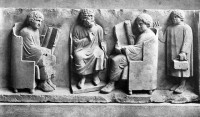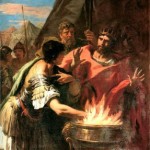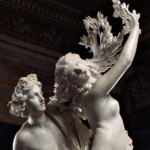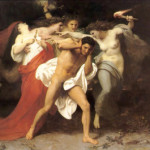Some people think that idioms are the most obscure subject that can be encountered when attempting to learn a foreign language, and we might agree with this assumption. Beacause of their sheer nature of crystalized linguistic structures whose origins have often been lost in the process of language evolution, idioms are always a very tricky issue in the hands of a foreign student. That said, Italian language students should not fear, for many native speakers, when asked, cannot explain the source of idioms that they nevertheless use everyday.
When it comes to Italian, the rich and well documented history of its predecessor, Latin, allows us to track down the origin of many commonly used idioms.
Here’s a list of Italian idioms originated by concepts and customs of the ancient Rome:
Metterci la mano sul fuoco (literally: to put one’s hand on fire). This expression, meaning “being so sure about something one could swear on it”, originates from a latin legend involving the historical carachter Muzio Scevola, a young roman aristocrat who, in the VI century b.C., voluntarily burned his right hand because it failed in killing the Etruscan king Porsenna. The connection between the act of bravery ascribed to the roman warrior and the condition of being extremely sure about something lies in Muzio’s utmost firmness of his own beliefs.
Essere una pietra miliare (literally: to be a milestone). Yes, this one exists in English too, but the origin is 100% Latin. Milestones were in fact actual stones that romans used to put alongside their neverending consular routes (such as via Appia, via Casilina, via Tuscolana etc.) in order to mark the distance from the Urbe. Therefore, being a pietra miliare figuratively means being a turning point, after which something changes forever.
Dormire sugli allori (literally: to rest on laurels). Again, you have this in the English language too. The origin of this idiom is relatively clear, due to the common iconography connected to the concept of success, which has remained basically unchanged from the times of ancient Greece (and Rome). Laurel, commonly associated to Apollo, was and still is a symbol of victory (both military and artistic); “to rest on it” means to stop trying because one is satisfied with one’s past achievements. As simple as that.
Tizio, Caio e Sempronio (Tom, Dick and Harry). This is a placeholder for unidentified subjects, and expressions similar to this one are present, with culturally connoted variants, in many languages. The italian form comes from the names of three historical figures, the Gracchi brothers (Tiberio and Gaio) and their father (Sempronio). The first use of these three names as placeholder can be found in a XI century document from the jurisconsult Irnerio.
Passare sotto le forche caudine (running the gauntlet). This idiom comes directly from an historical event, the battle of the Forche Caudine (321 b.C.), in which the roman army was shamefully defeated by the Samnites. It is told by many historician (such as Tito Livio) that the surviving roman soldiers were humiliated by being forced to pass between two rows of enemy soldiers. which whipped, tortured and insulted them. In modern language the expression means experiencing a deep humiliation or enduring a series of abuses.
Andare su tutte le furie (to rampage). This one comes from greek mythology, in which the Furies (Aletto, Tisifone and Megera) were the personification of vengeance and wrath. In the greek and roman society, people used to offer sacrifices to calm their blind and destructive rage, to which no human being could resist. Knowing this, the meaning of the italian expression becomes pretty clear: no need to rampage!
Una vittoria di Pirro (a phyrric victory). Have you ever experience the awful sensation of winning a battle but losing the war because the cost of your victory is so high that it is unbearable in the long term? Well, that’s exactly how the Epirus king, Pirro felt when defeating the Romans in 280 b.C. at the Eraclea battle.
Clearly this list includes just a small part of the huge amount of monuments left in our language by the Latin world. Nevertheless, is somehow comforting to see how those evidences of the human spirit can be appreciated even in our everyday Italian language.
by Enrico Piciarelli, teacher @ Kappa language school
Have you got a question for us? Email it to antonio.lucicesare@gmail.com





